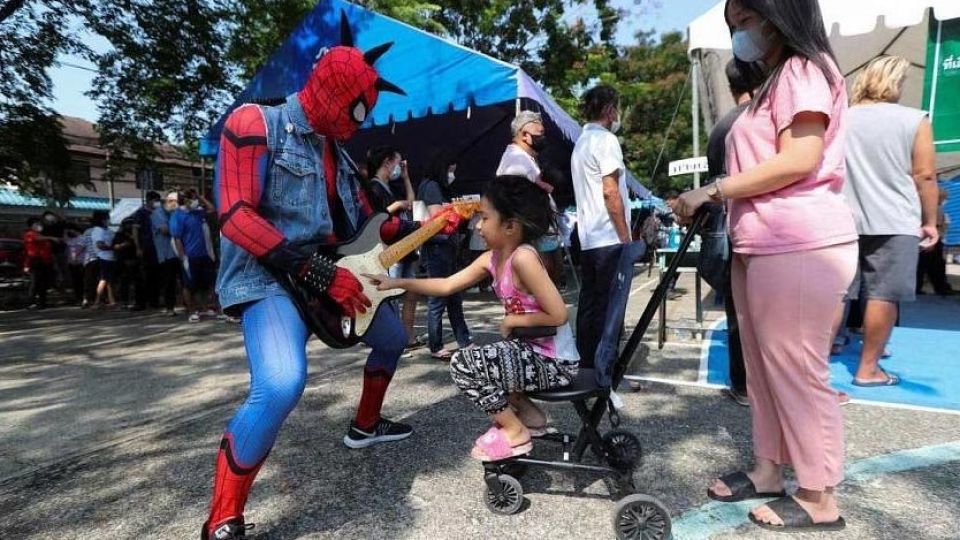May 15, 2023
SINGAPORE – In makeshift tents sealed off by blue tarpaulin and yellow barrier tape, election commission staff kept watch on the alarm clocks placed by the clear plastic ballot boxes at their polling stations. At the stroke of 8am, they swung into action, admitting the early birds who had queued up to cast their votes.
Thailand’s general election on Sunday took place after weeks of intense campaigning that has largely pitted conservative military-backed factions against a party that has won every single election in the last two decades.
Caretaker Prime Minister Prayut Chan-o-cha, 69, a former army chief who has helmed Thailand since staging the 2014 military coup, is fighting to return as premier as a nominee of the United Thai Nation party.
He is up against the Pheu Thai Party, which ran the government ousted by his 2014 coup. Pheu Thai’s campaign is fronted by its prime minister nominees Srettha Thavisin, a 60-year-old former property mogul, and Paetongtarn Shinawatra, a 36-year-old business executive who is the daughter of self-exiled former premier Thaksin Shinawatra. Pheu Thai has a third nominee for premier, Mr Chaikasem Nitisiri, a 74-year-old former attorney-general.
Another formidable challenger to Mr Prayut is the Move Forward Party, a progressive party advocating fundamental reforms of Thai politics and economy.
Voting, which took place from 8am to 5pm Bangkok time (9am to 6pm Singapore time), was largely peaceful and uneventful.
Bangkok was noticeably quieter, with migrant workers having returned to their home provinces to vote. Many voters – including elderly folk who were struggling to walk – turned up early in the morning to cast their ballots, but the 35 deg C heat caused some to faint while waiting for their turn.
Over in the southern province of Chumpon, a couple arrived at a polling station in full wedding attire after completing their morning nuptial ceremony, Thai PBS news outlet reported.
Key politicians who had spent gruelling weeks campaigning took time out for other activities before or after voting.
Caretaker Deputy Prime Minister Anutin Charnvirakul presided over the wedding of a young couple in Bangkok on Sunday morning, before travelling to Buriram province to cast his vote. The leader of Bhumjaithai Party made sure he changed into a shirt with cannabis leaf motifs for the cameras – perhaps to remind people of the work his party had done to decriminalise medical cannabis in the kingdom.
Mr Srettha, Pheu Thai’s prime minister candidate, cast his vote in Bangkok’s Klongtoey district shortly after 8am. He told reporters that he would spend the rest of the day meeting friends and seeing a doctor before regrouping at the party’s headquarters in Bangkok in the evening.
@PheuThaiParty's key prime minister candidate Srettha Thavisin @Thavisin casts his ballot in Bangkok's Sukhumvit Soi 16 in Thailand's general election #เลือกตั้ง66 pic.twitter.com/WD6wXhemEF
— Tan Hui Yee (@Tan_Hui_Yee) May 14, 2023
Amid fears of attempts to skew election results, some voters tried to make a statement. A voter in the central Nakhon Nayok province stood at the ballot box and loudly cursed anyone who tried to cheat in this election before casting his vote, reported Prachatai news outlet.
Youth political activist Parit Chiwarak, one of the key leaders of anti-government student protests that broke out in 2020, went to vote wearing a cardboard box over his head. On the box was scrawled the words: “Election commission, don’t cheat.”
There are about 52 million eligible voters in this election, and Thailand’s election commission has said it expects 80 per cent of them to cast their ballots. In the 2019 election, 74.69 per cent of the electorate cast their votes.
The mood among voters was calm and hopeful. Ms Sariya Kanrayanamit, for example, was upbeat about the changes that will come after this election.
“I think a lot of people will come out to vote this time round, because we want to give Thailand a new future,” the 50-year-old accountant told The Straits Times. “I’m excited about the leader who’s going to emerge from this.”
Ms Nontaporn Ounprasertsuk 30, a bank worker who voted in Bangkok’s Phaya Thai district, said she woke up early to take her family to the polling station.
“In recent years, those who care about democracy have been disappointed,” she said. “So today’s vote is important for Thailand.”
Sunday’s polls were held under new rules where voters cast two ballots – one for their choice of constituency candidate and one for the political party they wish to support. This system favours parties with deep grassroots support like Pheu Thai.
But to install a prime minister, a party must win more than a simple majority in the 500-seat Lower House. Under a system brought into effect by the junta that governed before 2019, an appointed 250-seat Senate gets to vote alongside 500 elected representatives on who becomes premier.
Additional reporting by Tan Tam Mei


